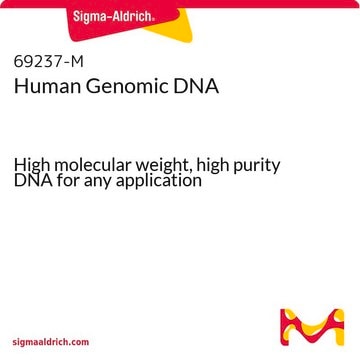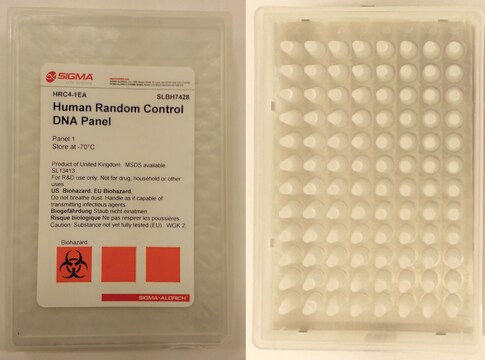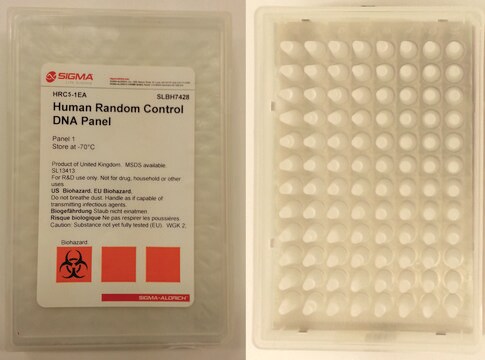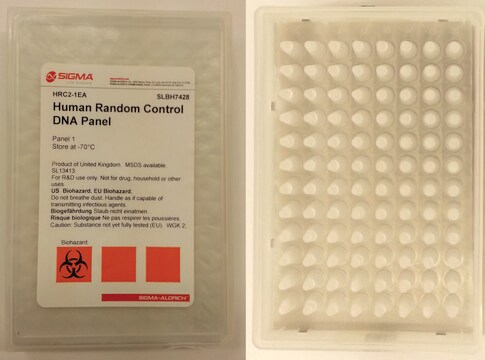Recommended Products
Looking for similar products? Visit Product Comparison Guide
Application
Sigma-Aldrich and ECACC have teamed together to provide researchers with control populations of human genomic DNA for gene regulation and quantitative PCR research.
The range of Human Random Control (HRC) DNA samples represents a control population of 480 UK Caucasian blood donors. The HRC DNA is extracted from lymphoblastoid cell lines derived by Epstein Barr Virus (EBV) that can be continuously propagated in culture. This ensures an infinite supply of the unvarying DNA panels. The composition of each panel is completely defined and standardized so that each lot will be identical. Therefore, the HRC DNA Panels can be used as Reference Standards as routine quality control in the laboratory.
The purified HRC DNA is available in 5 different panels (HRC 1 through 5) consisting of 96 individuals with 2 μg each at a concentration of 100 ng/μL. The DNA is dissolved in 10 mM Tris (pH 8) 1 mM EDTA.
For ordering purposes, the 96-well plate format is listed as a 1 EACH (1EA) package size.
The range of Human Random Control (HRC) DNA samples represents a control population of 480 UK Caucasian blood donors. The HRC DNA is extracted from lymphoblastoid cell lines derived by Epstein Barr Virus (EBV) that can be continuously propagated in culture. This ensures an infinite supply of the unvarying DNA panels. The composition of each panel is completely defined and standardized so that each lot will be identical. Therefore, the HRC DNA Panels can be used as Reference Standards as routine quality control in the laboratory.
The purified HRC DNA is available in 5 different panels (HRC 1 through 5) consisting of 96 individuals with 2 μg each at a concentration of 100 ng/μL. The DNA is dissolved in 10 mM Tris (pH 8) 1 mM EDTA.
For ordering purposes, the 96-well plate format is listed as a 1 EACH (1EA) package size.
Signal Word
Warning
Hazard Statements
Precautionary Statements
Hazard Classifications
Eye Irrit. 2
Storage Class Code
11 - Combustible Solids
WGK
WGK 2
Certificates of Analysis (COA)
Search for Certificates of Analysis (COA) by entering the products Lot/Batch Number. Lot and Batch Numbers can be found on a product’s label following the words ‘Lot’ or ‘Batch’.
Already Own This Product?
Find documentation for the products that you have recently purchased in the Document Library.
Customers Also Viewed
Rapid genetic analysis of x-linked chronic granulomatous disease by high-resolution melting.
Hill HR
The Journal of Molecular Diagnostics : JMD, 12(3), 368-376 (2010)
Irene Bravo-Alonso et al.
Human mutation, 38(6), 678-691 (2017-03-01)
The rapid analysis of genomic data is providing effective mutational confirmation in patients with clinical and biochemical hallmarks of a specific disease. This is the case for nonketotic hyperglycinemia (NKH), a Mendelian disorder causing seizures in neonates and early-infants, primarily
Kenneth A Myers et al.
Epilepsia, 59(2), 381-388 (2017-12-22)
To investigate the significance of variation in ADGRV1 (also known as GPR98, MASS1, and VLGR1), MEF2C, and other genes at the 5q14.3 chromosomal locus in myoclonic epilepsy. We studied the epilepsy phenotypes of 4 individuals with 5q14.3 deletion and found
Cindy Chang et al.
Clinical and translational gastroenterology, 8(3), e80-e80 (2017-03-17)
Primary sclerosing cholangitis (PSC) is a chronic inflammatory disease of the bile ducts frequently associated with inflammatory bowel disease (IBD), suggesting an important role for the gut-liver axis. Defensins are small (3.5-4.5 kDa) anti-microbial peptides that contribute to innate immunity at
Rosie M Butler et al.
The Journal of investigative dermatology, 139(9), 1975-1984 (2019-03-27)
FK228 (romidepsin) and suberoylanilide hydroxamic acid (vorinostat) are histone deacetylase inhibitors (HDACi) approved by the US Food and Drug Administration for cutaneous T-cell lymphoma (CTCL), including the leukemic subtype Sézary syndrome. This study investigates RAD23B and STAT3 gene perturbations in
Articles
DNA, RNA, cDNA derived from ECACC mammalian cell lines allow screening for genes or expression patterns to identify lines most suitable for specific research.
Our team of scientists has experience in all areas of research including Life Science, Material Science, Chemical Synthesis, Chromatography, Analytical and many others.
Contact Technical Service










